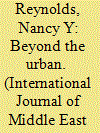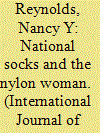| Srl | Item |
| 1 |
ID:
131549


|
|
|
|
|
| Publication |
2014.
|
| Summary/Abstract |
Studies of public space focus disproportionately on cities. Complex and densely populated urban built environments-with their streets, plazas, institutional buildings, housing projects, markets-make concrete and visible attempts to manage difference. They also structure the ways that less powerful residents challenge and sometimes remake elites' spatial visions of the social order. The robust literature in Middle East studies on Islamic cities, colonial cities, dual cities, quarters and ethnicities, port cities, and so forth is no exception to this urban focus.
|
|
|
|
|
|
|
|
|
|
|
|
|
|
|
|
| 2 |
ID:
103464


|
|
|
|
|
| Publication |
2011.
|
| Summary/Abstract |
he specific ways that cloth-"foreign silks," "durable Egyptian cottons," and "artificial silks"-emerged as a potent and visible symbol through which to contest the relations of colonialism and establish national community in Egypt varied with the changing realities of Egypt's political economy. The country's early importation of textiles despite its cultivation of raw cotton, the growth of its state-protected local mechanized industry working long- and medium-staple cotton for a largely lower-class market, and that industry's diversification into artificial silk technologies all helped structure a shift from "foreign silks" to "the nylon woman" as tropes in popular and political discourse defining the limits of the national community and the behaviors suitable for it. Although artificial fibers considerably lowered the cost of hosiery and other goods, thereby expanding consumption, the use of synthetics like nylon rather than cotton subverted the goal of national economic unity between agriculture and industry.
|
|
|
|
|
|
|
|
|
|
|
|
|
|
|
|